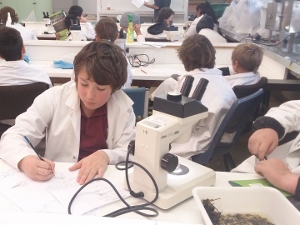
The 14 students, from Years 7 to 10, enjoyed the chance to gain some hands-on experience of science as part of their STEM programme at NorthTec.
Under the STEM (Science, Technology, Engineering and Mathematics) programme, school students link up with tertiary education providers to experience active learning. Students are encouraged to actively think about the subject matter, make their own connections, and structure their own understanding.
Tikipunga High School has been working all year to restore the stream at Pehiaweri Marae, in Glenbervie. The students have been able to link up with NorthTec scientists, who have provided technical input and assistance via the STEM programme.
Over the year the students, their teachers and NorthTec tutors have worked to eliminate pollution of the stream by planting it out and placing rocks in the water. While the plants release oxygen into the water, the rocks provide further oxidation by forcing the water to filter over them, and create a natural atmosphere through the trickling sound they create.
With the first phase of restoration almost complete, the students are now looking at pest control in the area. The group were encouraged to think about ways of targeting pest species without harming other wildlife, discussing both sides of the argument for using pest control measures like 1080. They discussed their effectiveness in killing pests like rats, but also their side-effects in harming native species like the kea, a common 1080 “by-kill”.
The students then moved on to dissect a rat – starting with a virtual dissection using an iPad, then working on the real thing, under the supervision of NorthTec Applied Science tutor, Nigel Studdart. The dissection exercise compared the anatomy of the rat to that of humans and other mammals, sparking a lively debate on common structures and how this could enable pest controllers to target one species only.
The session was rounded off back at the marae, where practical learnings were used to consider the best methods of eliminating or controlling pests, from traps to various forms of poison. The student group will now look at designing safe pest control measures to target the rat population, as part of their work for the 2015 Northland Science Fair.
“It was a great day of exploration in biology and discovery in terms of what our native wildlife means to us,” Mr Studdart said.
“The students developed an interest in how we can specifically target a rat as opposed to other species, and they will research this further.
“We considered the economic and social costs of using 1080 or not using it, and the comparative anatomy of different mammals and how they work. We also used this opportunity to consider evolution and adaptation, and the fight to restore species which are living outside a biological niche,” he said.
“STEM training is critically important to New Zealand’s economy. The chief scientist of Australia estimates that in 10 years’ time, 85 per cent of occupations will require this type of education. NorthTec is looking to the future of Northland’s workforce; next year our STEM programme will expand to STEAM – with the addition of Arts and Applications. We will also look at including biology and chemistry, plus mechatronics and coding.”
Bullying contributes to poor wellbeing and absenteeism in New Zealand. Discover how you can address…
Free school lunches will continue under a modified model which will reportedly see $107 million…
A new interactive website showing daily attendance figures was launched last week as part of…
Two reviews of early literacy approaches and an accompanying Ministry of Education commentary show promising…
We must have bipartisan decision-making for education, says academics Bronwyn E. Wood and Taylor Hughson…
The OECD’s new report makes several policy recommendations for our education sector in the hopes…
This website uses cookies.